 W
WAfter the Banquet is a 1960 novel by Yukio Mishima.
 W
WAlmost Transparent Blue is a 1976 novel, written by Japanese author Ryū Murakami, that features a portrait of narrator Ryū and his friends trapped in a cycle of sex, drugs and rock 'n roll during the 1970s.
 W
WAmagi Brilliant Park is a Japanese light novel series written by Shoji Gatoh and illustrated by Yuka Nakajima. Fujimi Shobo has published eight volumes since February 20, 2013, under their Fujimi Fantasia Bunko imprint. J-Novel Club has licensed the series for an English release, with the first volume released digitally on September 9, 2018. There are three manga adaptations published by Fujimi Shobo and Kadokawa. A 13-episode anime television series adaptation by Kyoto Animation aired in Japan between October 6 and December 25, 2014.
 W
WAudition (オーディション) is a Japanese novel by Ryu Murakami published in 1997 and published in English in 2009. It was the basis for the film by Takashi Miike released in 1999 and a possible English-language film adaptation.
 W
WCage on the Sea is a 1998 novel, written by Japanese author Kaoru Ohno about a group of Japanese holdouts on the island of Anatahan in the Pacific Ocean. The Anatahan holdouts had also inspired a 1953 film, Anatahan.
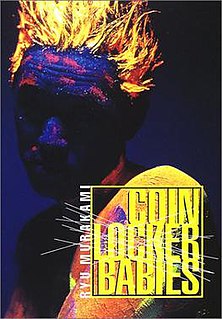 W
WCoin Locker Babies , 1980, is a novel by Ryū Murakami about coin-operated-locker babies, translated into English by Stephen Snyder. The translation was published in 1995 by Kodansha International Ltd and republished in 2013 by Pushkin Press. A Bildungsroman novel, Coin Locker Babies is known for transcending genres, containing elements of social commentary, surrealism, dark comedy, philosophy, noir and horror.
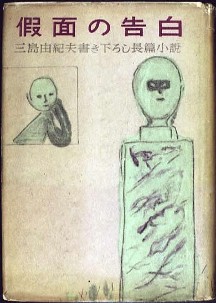 W
WConfessions of a Mask is Japanese author Yukio Mishima's second novel. First published in 1949, it launched him to national fame though he was only in his early twenties.
 W
WThe Devotion of Suspect X is a 2005 novel by Keigo Higashino, the third in his Detective Galileo series and is his most acclaimed work thus far. The novel won him numerous awards, including the 134th Naoki Prize, which is a highly regarded award in Japan. The novel also won the 6th Honkaku Mystery Award, which is one of the most prestigious awards in the mystery novels category in Japan. 2006 Honkaku Mystery Best 10 and Kono Mystery ga Sugoi! 2006, annual mystery fiction guide books published in Japan, ranked the novel as the number one.
 W
WForbidden Colors is a 1951 novel by the Japanese writer Yukio Mishima, translated into English in 1968. The name kinjiki is a euphemism for homosexuality. The kanji 禁 means "forbidden" and 色 in this case means "erotic love", although it can also mean "color". The word "kinjiki" also means colors that were forbidden to be worn by people of various ranks in the Japanese court. It describes a marriage of a gay man to a young woman. Like Mishima's earlier novel Confessions of a Mask, it is generally considered somewhat autobiographical.
 W
WHouse of the Sleeping Beauties is a 1961 novella by the Japanese author Yasunari Kawabata. It is a story about a lonely man, Old Eguchi, who continuously visits the House of the Sleeping Beauties in hope of something more.
 W
WIn the Miso Soup is a novel by Ryu Murakami. It was published in 1997 in Japanese, and in 2003 in English. The novel won the Yomiuri Prize for Fiction in 1997.
 W
WJourney Under the Midnight Sun is a mystery novel written by Keigo Higashino, first serialized in the monthly novel magazine Subaru from Shueisha from January 1997 to January 1999. The entire volume was published in August 1999 and became a bestseller.
 W
WKyōko no Ie (鏡子の家) is a 1959 novel by the Japanese writer Yukio Mishima.
 W
WThe Lake is a short 1954 novel by the Japanese writer Yasunari Kawabata. This book tells the story of a former schoolteacher named Gimpei Momoi.
 W
WThe Master of Go is a novel by the Japanese author Yasunari Kawabata, who was awarded the Nobel Prize in Literature in 1968. The novel was first published in serial form in 1951. Titled Meijin (名人) in its original Japanese, Kawabata considered it his finest work, although it is in contrast with his other works. It is the only one of Kawabata's novels that the author considered to be finished.
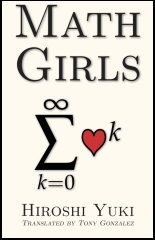 W
WMath Girls is the first in a series of math-themed young adult novels of the same name by Japanese author Hiroshi Yuki. It was published by SoftBank Creative in 2007, followed by Math Girls: Fermat's Last Theorem in 2008, Math Girls: Gödel's Incompleteness Theorems in 2009, and Math Girls: Randomized Algorithms in 2011. As of December 2010, the series had sold over 100,000 books in Japan. On November 23, 2011, an English translation of the book was released by Bento Books, who subsequently released translations of Fermat's Last Theorem (ISBN 978-0983951339) and Gödel's Incompleteness Theorems (ISBN 978-1939326294) on December 5, 2012 and April 25, 2016, respectively.
 W
WMiracles of the Namiya General Store is a 2012 Japanese novel written by Keigo Higashino and published by Kadokawa Shoten.
 W
WThe Old Capital is a novel by Yasunari Kawabata originally published in 1962. It was cited by the Nobel Committee in their decision to award Kawabata the 1968 Prize for Literature. A number of movie adaptations have been made of it, including Twin Sisters of Kyoto, which was nominated for the Academy Award for Best Foreign Language Film in 1964.
 W
WPiercing is a novel by Ryu Murakami. Originally published in Japanese in 1994, it was translated and published in English by Bloomsbury Publishing in 2008. An American film adaptation starring Christopher Abbott and Mia Wasikowska, directed by Nicolas Pesce, was released in 2019.
 W
WQuantum Devil Saga: Avatar Tuner, Vol. 1 is a 2011 science fiction novel by Japanese author Yu Godai, the first in a series of five installments. It is the author's reimagined take on the story of the Digital Devil Saga series of role-playing games. While the original games were set in the world of the Megami Tensei video games, the novel series does not take place in the Megami Tensei continuity.
 W
WThe Sailor Who Fell from Grace with the Sea is a novel written by Yukio Mishima, published in Japanese in 1963 and translated into English by John Nathan in 1965.
 W
WSalvation of a Saint is a 2008 novel by Keigo Higashino, the fourth in his Detective Galileo series. The English translation was published in 2012.
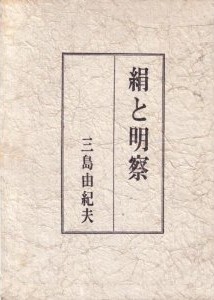 W
WSilk and Insight is a 1964 novel by the Japanese writer Yukio Mishima. The subject of the novel is taken from an actual strike in Japan in 1954 at Omi Kenshi, a silk thread and fabric manufacturer, which lasted for 106 days. The novel was first serialised in the monthly magazine Gunzo between January–October 1964. It was published in hardcover format by Kodansha on 15 October 1964. It was translated into English in 1998 by Hiroaki Sato.
 W
WThe Sound of the Mountain is a novel by Japanese writer Yasunari Kawabata, serialized between 1949 and 1954. The Sound of the Mountain is unusually long for a Kawabata novel, running to 276 pages in its English translation. Like much of his work, it is written in short, spare prose akin to poetry, which its English-language translator Edward Seidensticker likened to a haiku in the introduction to his translation of Kawabata's best-known novel, Snow Country.
 W
WThe Sound of Waves is a 1954 novel by the Japanese author Yukio Mishima. It is a coming-of-age story of the protagonist Shinji and his romance with Hatsue, the beautiful daughter of the wealthy ship owner Terukichi. For this book, Mishima was awarded the Shincho Prize from Shinchosha Publishing in 1954. It has been adapted for film five times.
 W
WThirst for Love is a 1950 novel by the Japanese writer Yukio Mishima. The word "kawaki" literally means thirst, but has a sense of parched dryness associated with it.
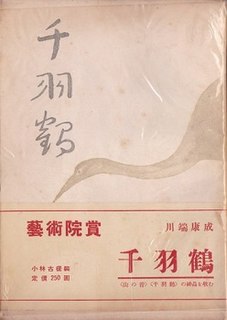 W
WThousand Cranes is a 1952 novel by Japanese author Yasunari Kawabata. The novel is divided into five episodes: "Thousand Cranes", "The Grove in the Evening Sun", "Figured Shino", "Her Mother's Lipstick" and "Double Star".